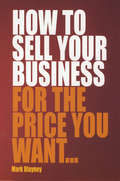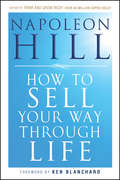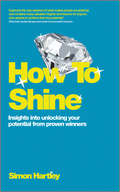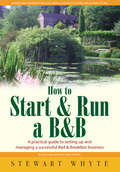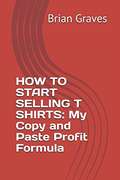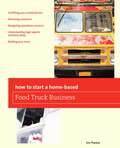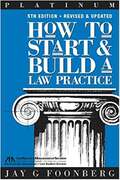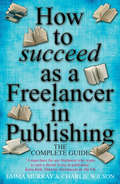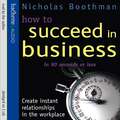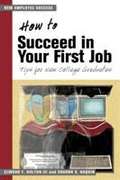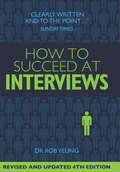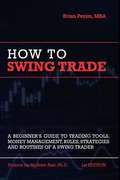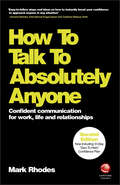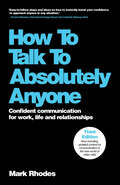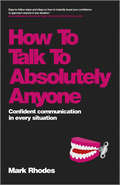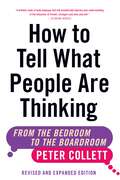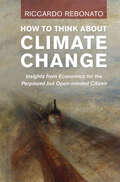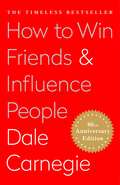- Table View
- List View
How To Sell Your Business For the Price You Want
by Mark BlayneySome people only ever sell their business once, usually when they are looking to retire. Others will find themselves selling their businesses a number of times during their careers as they move from one project to the next. But both types of people have one thing in common: they need to get the best deal possible out of the sale.This practical, commonsense book will help to secure the best result. Now updated and revised, it is in its 2nd updated edition. It offers first-hand advice on the whole sale process from deciding why and when to sell through getting the best sale to completing the deal. Charts and examples offer advice on essential legal, financial and strategic issues for all types of enterprises, however big or small your business.
How To Sell Your Way Through Life
by Napoleon HillTIMELESS WISDOM from the ORIGINAL PHILOSOPHER of PERSONAL SUCCESS"No matter who you are or what you do, you are a salesperson. Every time you speak to someone, share an opinion or explain an idea, you are selling your most powerful asset . . . you! In How to Sell Your Way Through Life, Napoleon Hill shares valuable lessons and proven techniques to help you become a true master of sales."--Sharon Lechter, Coauthor of Think and Grow Rich: Three Feet from Gold; Member of the President's Advisory Council on Financial Literacy"These proven, time-tested principles may forever change your life."--Greg S. Reid, Coauthor of Think and Grow Rich: Three Feet from Gold; Author of The Millionaire Mentor"Napoleon Hill's Think and Grow Rich and Laws of Success are timeless classics that have improved the lives of millions of people, including my own. Now, we all get the chance to savor more of his profound wisdom in How to Sell Your Way Through Life. It is a collection of simple truths that will forever change the way you see yourself."--Bill Bartmann, Billionaire Business Coach and Bestselling Author of Bailout Riches (www.billbartman.com)Napoleon Hill, author of the mega-bestseller Think and Grow Rich, pioneered the idea that successful individuals share certain qualities, and that examining and emulating these qualities can guide you to extraordinary achievements.Written in the depths of the Great Depression, How to Sell Your Way Through Life explores a crucial component of Achievement: your ability to make the sale. Ringing eerily true in today's uncertain times, Hill's work takes a practical look at how, regardless of our occupation, we must all be salespeople at key points in our lives. Hill breaks down concrete instances of how the Master Salesman seizes advantages and opportunities, giving you tools you can use to effectively sell yourself and your ideas. Featuring a new Foreword from leadership legend Ken Blanchard, this book is a classic that gives you one beautifully simple principle and the proven tools to make it work for you.
How To Shine
by Simon HartleyFIX YOUR MINDSET AND UNLEASH YOUR TALENTSimon Hartley spent many years working with world class athletes and helping them to new levels of achievement. Then he got wondering: What is it that enables some people to develop their talent in a more impactful way than others? What differentiates the winners from those who almost made it? And how can we be world class in our chosen fields?How To Shine is more than just a window into the world of winning. It's the distillation of all Simon has learned from talking to and coaching some of the world's top success stories, from Premiership footballers and Olympiads to champions of business. It's a practical, step by step guide to honing skills which are as vital in the office as they are on the athletics track and truly shining in your field.Includes:Practical, life-affirming tipsInsights into the winning mentality from sportsmen, coaches, Michelin starred chefs and scientistsHow to develop skills which will enable you to be a genuine leader in your field
How To Start A Conversation And Make Friends: Revised And Updated
by Don GaborNow revised and updated for the digital era, the classic bestseller How to Start a Conversation and Make Friends has helped hundreds of thousands of people communicate with wit, confidence, and enthusiasm for more than a generation.Small-talk expert Don Gabor has completely revised and updated this definitive guide, showing how to combine essential techniques in the art of conversation with necessary skills for communicating in the twenty-first century. By following the simple and dynamic guidelines in this easy-to-read book, you’ll be ready to strike up a great conversation anytime, anywhere—whether you’re at a cocktail party or chatting online. Learn how to keep the conversation going by asking the right questions, using body language effectively, and avoiding conversation pitfalls. Combining his tried-and-true methods with a whole new section on communicating online and through social networking, Don Gabor shows you how to: · Identify your personal conversation style· Engage in online conversations using proper etiquette and security· Turn online conversations into face-to-face relationships· Boost your personal and professional speaking skills to the next level Packed with charts, hundreds of opening lines, real-life examples, FAQs, helpful hints, and solid professional advice, How to Start a Conversation and Make Friends will help you connect with others at home, work, online, in person, and everywhere in between.
How To Start And Run a B&B 3rd Edition: A Practical Guide To Setting Up And Managing A Successful Bed And Breakfast Business
by Stewart WhyteREVISED AND UPDATED THIRD EDITION. "Owning a B&B is the dream of many...By giving you the tools to help make your operation a success my hope is that within a short time you will be able to live your dream." More and more people are considering downshifting. Buying a property that can pay for its upkeep and give you a comfortable lifestyle is a popular option. Not only has the interest grown in becoming a B&B proprietor, so has the interest by the public in the B&B as a viable short-break option. With this rise in popularity, however, come expectations, and this is where this book comes in. It will help you: * DETERMINE WHO YOUR CUSTOMERS ARE; * MANAGE THE NECESSARY FINANCIAL TOOLS; * READY YOUR HOUSE FOR B&B OR HELP YOU BUY OR BUILD A NEW ONE; * SUCCESSFULLY MARKET YOUR PROPERTY; * ENSURE YOU MAKE A PROFIT FROM YOUR ENTERPRISE. / In short, everything you need to know to make your B&B a truly special place to stay! This book has been written for would-be and current B&B owners. It can be used as a short course giving invaluable insights for the experienced and inexperienced alike.
How To Start And Run a B&B 3rd Edition: A Practical Guide to Setting Up and Managing a Successful Bed and Breakfast Business
by Stewart WhyteREVISED AND UPDATED THIRD EDITION. "Owning a B&B is the dream of many...By giving you the tools to help make your operation a success my hope is that within a short time you will be able to live your dream." More and more people are considering downshifting. Buying a property that can pay for its upkeep and give you a comfortable lifestyle is a popular option. Not only has the interest grown in becoming a B&B proprietor, so has the interest by the public in the B&B as a viable short-break option. With this rise in popularity, however, come expectations, and this is where this book comes in. It will help you: * DETERMINE WHO YOUR CUSTOMERS ARE; * MANAGE THE NECESSARY FINANCIAL TOOLS; * READY YOUR HOUSE FOR B&B OR HELP YOU BUY OR BUILD A NEW ONE; * SUCCESSFULLY MARKET YOUR PROPERTY; * ENSURE YOU MAKE A PROFIT FROM YOUR ENTERPRISE. / In short, everything you need to know to make your B&B a truly special place to stay! This book has been written for would-be and current B&B owners. It can be used as a short course giving invaluable insights for the experienced and inexperienced alike.
How To Start Selling T Shirts: My Copy And Paste Profit Formula
by Brian GravesI will teach you how to build your own HIGHLY PROFITABLE business selling T-Shirts by COPYING what the most successful sellers are already doing Follow my STEP-BY-STEP guide and build a sustainable business that will generate revenue, day in and day out. <P><P> If you’re reading this, you’re probably looking for a way to earn some extra cash online. And if you’re anything like me, you’ve already wasted countless $ on systems and guides that make unfulfillable promises… "“Earn Hundreds of dollars for only 20 minutes work” “This trading system will earn you THOUSANDS of $ per month on autopilot” <P><P> “Become an overnight millionaire with our system” <P><P> Sound Familiar? They do to me, because I used to fall for these marketing pitches over and over again. Surely, the next one I bought would finally earn me some big bucks on the internet.
How To Start a Business without Any Money
by Rachel BridgeDo you dream of starting your own business but don’t have any money? What if you could set up a venture with nothing but a good business idea and the determination to make it work?It’s an appealing idea, particularly in the current economic climate where no one has cash to spare and austerity rules the day. In fact, studies show that more people start businesses during recessions than at any other time. The good news is that it can be done, provided you follow a few golden rules. Based on Rachel Bridge's popular workshops, this book will help set you on the way to success. As the former Enterprise Editor for the Sunday Times, Rachel has interviewed hundreds of successful entrepreneurs. Join her on her journey as she starts up her very own enterprise, entrepreneurthings.com, and covers all the ups and downs she encounters, while giving examples along the way of how real-life entrepreneurs have coped with the same problems that beset everyone in business at some point.
How To Start a Home-based Food Truck Business (Home-Based Business Series)
by Eric ThomasFrom designing your food truck and identifying your market to establishing a business plan and determining the operational concerns of a mobile business, this comprehensive guide provides down-to-earth advice on every aspect of setting up and running a food truck business. Learn all about overcoming the hurdles facing the mobile food vendor, the legal aspects of food safety, menu planning, setting up your home-based headquarters, and navigating the catering industry. Whatever your plans, each chapter can help you experience the satisfaction of establishing and building your own home-based food truck business and reaching opening day! Look for useful charts and worksheets throughout the book, including: Preferred Vendor Checklist Start-Up Cost WorksheetsSample Operational Weekly Schedule 7878Outfitting your mobile kitchenAttracting customersNavigating operations concernsUnderstanding legal aspects and food safetyBuilding your menu
How To Start and Build a Law Practice
by Jay G. FoonbergA classic ABA bestseller, How to Start and Build a Law Practice has been used by tens of thousands of lawyers as the comprehensive guide to planning, launching, and growing a successful practice. Author Jay G Foonberg, now in his fifth decade of practicing law, has always been dedicated to giving other lawyers the benefit of his wealth of experience. This Platinum Fifth Edition is packed with over 600 pages of guidance on identifying the right location, finding clients, setting fees, managing your office, maintaining an ethical and responsible practice, maximizing available resources, upholding your standards, and much more. If you’re committed to starting—and growing— your own practice, this one book will give you the expert advice you need to make it succeed. More than 100,000 lawyers have turned to Jay Foonberg for the secrets to running a successful law firm; now you can, too, with the new Platinum Fifth Edition. <P><P> Jay Foonberg has organized the book into short, easy-to-read chapters that deal with all the specific challenges you will encounter when you open your office. The answers you'll get are realistic, practical, and based on real-life experience. You’ll find a wealth of tips that can improve your practice once it is up and running, as well as dozens of time-saving templates and checklists. In addition, there is all-new material for this edition, covering topics including: <P><P> New opportunities for serving senior clients and the growth of elder law E-mail and the Internet Law firm mergers and dissolutions The increasing size of student loans Opportunities created by an aging population Nonlawyer consultants The globalization of legal practice When and how to safely close and destroy files The aggressive marketing being done now by firms of all sizes And much more! Even if you already have an established practice, you are sure to find information that will help you compete and succeed. This is the one book you’ll need to build and grow your practice.
How To Start and Run a Holiday Cottage Business (2nd Edition): A Practical Guide To Buying And Letting Holiday Houses
by Gillean SangsterMany people dream of buying a house in the country or near the coast, with outbuildings that can be converted into holiday lets; or of taking over an existing holiday cottage business. Gillean Sangster did it. She moved to Scotland with her husband where they started their own successful holiday cottage business. In this book, she tells you how you can do it too.
How To Start and Run a Holiday Cottage Business (2nd Edition): A practical guide to buying and letting holiday houses
by Gillean SangsterMany people dream of buying a house in the country or near the coast, with outbuildings that can be converted into holiday lets; or of taking over an existing holiday cottage business. Gillean Sangster did it. She moved to Scotland with her husband where they started their own successful holiday cottage business. In this book, she tells you how you can do it too.
How To Succeed As A Freelancer In Publishing
by Charlie Wilson Emma MurrayThis book tells you how to build a successful freelance business around supplying publishing services. The publishing industry depends on freelancers: writers and editors, proofreaders and designers, PR and typesetters. For those in the know, there is a wealth of opportunities on offer. Graduates, retired professionals, in-house editors, career-changers more and more people are taking the plunge and going freelance. You can succeed as a freelancer in publishing, and this book shows you how. It includes top tips; insider knowledge and case studies; information on how to market yourself, deal with finance and find out what your clients are looking for plus invaluable insights from other successful freelancers and industry experts.
How To Succeed As A Freelancer In Publishing: The Complete Guide - 'a Must-have For Any Freelancer Who Wants To Earn A Decent Living In Publishing'
by Charlie Wilson Emma MurrayThis book tells you how to build a successful freelance business around supplying publishing services. The publishing industry depends on freelancers: writers and editors, proofreaders and designers, PR and typesetters. For those in the know, there is a wealth of opportunities on offer. Graduates, retired professionals, in-house editors, career-changers more and more people are taking the plunge and going freelance. You can succeed as a freelancer in publishing, and this book shows you how. It includes top tips; insider knowledge and case studies; information on how to market yourself, deal with finance and find out what your clients are looking for plus invaluable insights from other successful freelancers and industry experts.
How To Succeed In Business In 90 Seconds Or Less
by Nicholas BoothmanPersuade a client to buy what you're selling. Energise the boss to act on your ideas. Rally the staff to see themselves as members of your team. No matter what the situation, success in business depends on having effective relationships. Nicholas Boothman's first book, HOW TO MAKE PEOPLE LIKE YOU IN 90 SECONDS OR LESS was a huge success. Now Boothman brings his innovative system of forging instant connections to the workplace. This is a book that deals not only with the importance of making a great first impression, but also with ongoing business relationships. Based on the breakthrough idea of rapport by design' HOW TO SUCCEED IN BUSINESS shows how to mine the potential in every situation, from an accidental meeting at the water cooler, to a brainstorming session, to a formal presentation before a large group. It digs into the fundamentals of persuasion, purpose and personality to get to the basis of self-confidence and effective communication. It covers traditional business concerns of team building, email and phone relationships and managing up and managing down.
How To Succeed In Your First Job: Tips For New College Graduates
by Elwood F. Holton Sharon S. Naquin Berrett-Koehler Publishers Inc. StaffPart One of a three-part series of a series of practical guidebooks on work transitions. These new books guide new hires-and their managers-step by step through the "breaking-in" process that is absolutely essential for helping new employees thrive. It is relatively easy to get new hires to be competent to perform the basic tasks they were hired to do. But success on the job is due to much more than that. It comes from understanding how the organization really works-the unique aspects of how things get done in that particular organization. And it comes from learning how to "fit in"-knowing how to get accepted, get respected, and earn credibility.
How To Succeed at Interviews 4th Edition
by Dr. Rob YeungThe new edition of this best-selling book tells you how to: * Give impressive answers to over 200 interview questions * Deal with interview nerves and project total confidence * Pass psychometric tests, competency-based questions, and assessment centres * Avoid the traps that interviewers lay for unwary job seekers * Turn every interview question to your advantage
How To Succeed at Interviews 4th Edition
by Rob YeungThe new edition of this best-selling book tells you how to: * Give impressive answers to over 200 interview questions * Deal with interview nerves and project total confidence * Pass psychometric tests, competency-based questions, and assessment centres * Avoid the traps that interviewers lay for unwary job seekers * Turn every interview question to your advantage
How To Swing Trade
by Andrew Aziz Brian PezimSwing trading is a type of trading in which you hold positions in stocks or other investments over a period of time that can range from one day to a few weeks or more. If you are a beginner trader, this book will equip you with an understanding of where to start, how to start, what to expect from swing trading, and how you can develop your own strategy based on your personal goals. If you are a trader with some existing experience, this book will give you some insights on the author's approach to swing trading, rules that I follow and some strategies that I have used over the years to make profitable trades.
How To Talk To Absolutely Anyone: Confident Communication for Work, Life and Relationships
by Mark RhodesTalk to anyone, anytime, about anything — with confidence. How to Talk to Absolutely Anyone is your personal handbook for stepping up your communication game. Part confidence coach and part social manual, this book reveals the reasons behind your reserve and offers real, practical ways to break through the barriers and make a connection. Whether you fear judgement and rejection or just don't know what to say, these simple exercises will equip you with a gold mine of social tools to get you through any situation. This new second edition has been updated to include the complete 30-day Zero to Hero Personal Confidence Course, to help you build your skills and increase your chances of getting what you want out of any conversation. Working step-by-step, you'll learn how to approach strangers, strike up a conversation and exit gracefully; by first changing your outlook, you develop the ability to navigate even tricky situations with confidence and ease. Conversation skills affect more than your social life — they can impact your career as well. In removing your social hesitance, you open up a whole new world of effective communication with customers and colleagues, and begin building the relationships that get you closer to your goals. This book provides real-world techniques to help you get better and better every day, enabling you to: Overcome your fear of rejection. Strike up a conversation with anyone, anywhere. Open up to make real connections and build strong rapport. Carry your confidence into networking, sales and more. Leave the days of awkwardness behind you. Stop running away from uncomfortable interactions and start getting comfortable instead. Whether you need to close the deal, build contacts or just make small talk at a party, How to Talk to Absolutely Anyone helps you build the confidence and skills you need to talk your way to success.
How To Talk To Absolutely Anyone: Confident Communication for Work, Life and Relationships
by Mark RhodesAn easy-to-understand, practical guide to become a confident communicator In this third edition of How to Talk to Absolutely Anyone: Confident Communications in Every Situation, entrepreneur, business mentor, and international speaker Mark Rhodes delivers a practical yet accessible guide to break through barriers and make a connection. Whether you fear judgement and rejection, or just struggle to know what to say, this book provides readers with the tools needed to navigate social situations. Working step-by-step, you'll learn how to approach strangers, strike up a conversation and exit gracefully; by first changing your outlook, you develop the ability to navigate even tricky situations with confidence and ease. Drawing on Mark Rhodes' extensive business and coaching experience, this new third edition has been updated to include information on technology and communication to reflect the ever-growing use of remote communication. This book provides real-world techniques to help you get better and better every day, enabling you to: Strike up a conversation with anyone, anywhere. Open up to make connections and build strong rapport. Overcome common fears and barriers about talking to others. Carry your confidence into career networking and everyday communication. Stop running away from uncomfortable interactions and start getting comfortable instead. How to Talk to Absolutely Anyone is your social manual to help you build up the charismatic confidence and skills needed to talk your way to success.
How To Talk To Absolutely Anyone: Confident Communication in Every Situation
by Mark RhodesBe a people magnet! Improving your people skills and becoming a people-person is a surefire route to success, happiness, and confidence. Weíve all looked enviously across the room at that person who seems to effortlessly interact with everyone – humorous, confident and well liked. That person is confident with people they donít know, they have no fear of rejection, they can handle difficult situations with apparent ease. Well now you can too. How to Talk to Absolutely Anyone will show you exactly how to develop better communication for better results. With Mark Rhodes sound advice you will be able to build rapport with absolutely anyone. Learn how to: • Overcome fear of rejection • Be confident with people you donít know • Deal with difficult situations • Get better outcomes from disputes • Communicate better to win you more business and more sales • Be more effective at networking at both business and social events
How To Tell What People Are Thinking (Revised and Expanded Edition): From the Bedroom to the Boardroom
by Peter CollettA trusted handbook for more than a decade, Peter Collett’s bestselling guide to body language, How to Tell What People Are Thinking, has been fully updated with the latest research, including insight into everything from Zoom meetings to the confounding world of online dating.Understand what people aren’t saying and what you’re unwittingly revealing about yourselfHow does the way someone use their feet show if they’re interested in you?Does knowing someone really well help or hinder your ability to tell when they’re lying?Why do people in business meetings touch their face while the boss is talking?How can you spot likely winners and losers at sporting events just by looking at them?How to Tell What People Are Thinking (Revised and Expanded Edition) answers these questions and explains how certain clues provide insight into people’s innermost thoughts. Social psychologist Peter Collett decodes the fascinating intricacies of body language and speech, analyzing behaviours that range from boardroom bravado to date-night deceit. Packed with both famous and everyday examples, this is an entertaining and invaluable guide to our society’s language of unconscious communication.
How To Think About Climate Change: Insights from Economics for the Perplexed but Open-minded Citizen
by Riccardo RebonatoCaught in the crossfire between climate deniers and catastrophists, the intelligent layperson is understandably bewildered when faced with the complexity of climate change. How To Think About Climate Change shows that economics provides not just a suitable, but an indispensable perspective to understand the root causes of the climate-change problem: scarcity of resources, externalities and free riding. Riccardo Rebonato argues that there are no silver bullets or easy solutions. However, he shows that the new-generation economics models offer a radically different insight about our best course of action from what most early models recommended – in particular, they suggest that fast and large-scale climate action can now be justified as the most cost-effective strategy without requiring the 'infinite altruism' of earlier models. Given the conceptual tools provided in this book, readers can decide whether they agree with these conclusions – and, if they do, what the most effective courses of action are.
How To Win Friends and Influence People: Large Print Edition (Deluxe Hardbound Edition Ser.)
by Dale CarnegieYOU CAN GO AFTER THE JOB YOU WANT...AND GET IT! YOU CAN TAKE THE JOB YOU HAVE...AND IMPROVE IT! YOU CAN TAKE ANY SITUATION YOU'RE IN...AND MAKE IT WORK FOR YOU! For more than sixty years the rock-solid, time-tested advice in this book has carried thousands of now famous people up the ladder of success in their business and personal lives. Now this previously revised and updated bestseller is available as eBook for the first time to help you achieve your maximum potential throughout the next century! Learn: * THREE FUNDAMENTAL TECHNIQUES IN HANDLING PEOPLE* THE SIX WAYS TO MAKE PEOPLE LIKE YOU* THE TWELVE WAYS TO WIN PEOPLE TO YOUR WAY OF THINKING* THE NINE WAYS TO CHANGE PEOPLE WITHOUT AROUSING RESENTMENT
